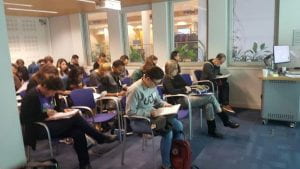This academic (2016/17) I have been working on the project ‘Exploring Learning Analytics’, as part of the work for this project I delivered a 30 minute session as part of the 2017 UCLU Education Conference.
The session description provided in the session guide was as follows:
Is there a story to be told, or is it all just nonsense? UCL collects and holds a variety of data about you and our systems. Some of this is real, and some of it is nonsense. How could these different data sets help us understand the story of you and your learning experiences at UCL? Join us as we follow the white rabbit into dataland and explore how data can be used and what if anything, it could tell us about teaching & learning and you.
Details of the conference can be viewed here: http://uclu.org/education-conference
Areas of activity: A1, A2, A4, K2, K4, V3 and V4
Inspiration, Alice and where next
 The theme for my session Data, Wonder and the Story of You was Alice in Wonderland. The idea was developed after talking to Steve Rowett and Eileen Kennedy about previous UCLU Education conference sessions, and reading Anastasia Salter’s project Alice in Dataland (http://aliceindataland.net/). This, plus my knowledge of Lewis Carroll led to the theme and idea for the session. (A2, K1).
The theme for my session Data, Wonder and the Story of You was Alice in Wonderland. The idea was developed after talking to Steve Rowett and Eileen Kennedy about previous UCLU Education conference sessions, and reading Anastasia Salter’s project Alice in Dataland (http://aliceindataland.net/). This, plus my knowledge of Lewis Carroll led to the theme and idea for the session. (A2, K1).
As there is limited evidence on the efficacy of learning analytics programs, and in particular outcomes from interventions, we do not yet know if these are meaningful or all nonsense, much like wonderland. It is this idea that I discussed in the Digital Education blog post Walking in a data wonderland. (V3, V4)
Also, the caterpillar ask Alice “Who are I?”, and it is this question we are asking of our students through our analysis. Who are they as students? – how are they interacting with our systems that potentially helps or hinders them will their studies? I purposefully chose the clip of the caterpillar reciting ‘How doth the little crocodile’ as I see it as a metaphor for the promise and perils of data analytics, especially when the data subjects are humans. (A2, K1)
JISC strongly emphasis student engagement with learning analytics, similar I believe it is important to include students and felt that students should be aware of what learning analytics is and that we are starting to explore the possibilities for UCL. (V3, V4)
The attendees seemed to the like the session, in particular the logic grid puzzles. In the Q&A there were no negative questions or comments about the content presented, but some students were surprised that we were not already using or looking to use some data sets. (A4)
My view on learning analytics is that it can be used to improve personal tutoring provision, by providing personal tutors with meaningful information about their tutees. Data that may prompt a discussion re: well being or to give tutors an overview of student engagement. For this reason I sat in on the discussion session for personal tutoring. Some students reported some tutors new nothing about the course they were studying, so felt time was wasted explaining that to them. The key theme was feeling that the tutor knew who they were and was approachable. I am hoping this is something that UCL can improve upon.
My experiences from my secondment in ISG and as a KS4 & 5 form tutor are behind my interest in using learning analytics for student well-being. I am currently in the process of undertaking a literature review, and my session proposal on this (‘Learning analytics
as a tool for supporting student well-being?’) for the ALT conference has been accepted.
Additionally, I am following-up on some findings from my primary analysis of laptop loan data and am hoping to survey students on their usage of the service. This is currently pending a new Data Protection Registration and amendment to the ethics registration for the Exploring Learning Analytics project.
Session activity – Seminar Schedule Muddle
Presentation slides for session – Data, Wonder and the story of you
Infinite Conf
I was invited by Skills Matter to give a talk on the 8th March 2017 as part of the InfiniteConf Bytes series of meet-ups.
InfiniteConf Bytes is a series of talks showcasing the speakers and topics for the upcoming InfiniteConf at Skills Matter in July (6th & 7th). At which I will be giving a talk entitled: Ethical Conundrums of an Educational Data Scientist.
I have chosen to speak about ethics at Inifinite Conf as it is core to the current learning analytics debate; especially with findings from the Royal Society on the lack of knowledge and understanding about machine learning and the upcoming General Data Protection Regulations. Data ethics is something I have been focusing on this year. This was the theme of my blog posts Data dialogues – new data, old data and respect and AI and society – the Asilomar Principles and beyond .
My talk on the 8th March was a general overview of what learning analytics is and what some of the difficulties faced by the field are.
A recording of the talk can be viewed at: https://skillsmatter.com/skillscasts/10055-learning-analytics-what-is-it-and-why-is-it-so-difficult-with-samantha-ahern .
A copy of the slide deck has been included below.
References
Photo credit: UCLU
‘Code of Practice for Learning Analytics’. 2017. Jisc. Accessed March 22. https://www.jisc.ac.uk/guides/code-of-practice-for-learning-analytics.
Prinsloo, Paul, and Sharon Slade. 2017. ‘An Elephant in the Learning Analytics Room: The Obligation to Act’. In , 46–55. ACM Press. doi:10.1145/3027385.3027406.
Sclater, N. (2017). Learning Analytics Explained. Routledge.
https://www.gov.uk/government/collections/teaching-excellence-framework